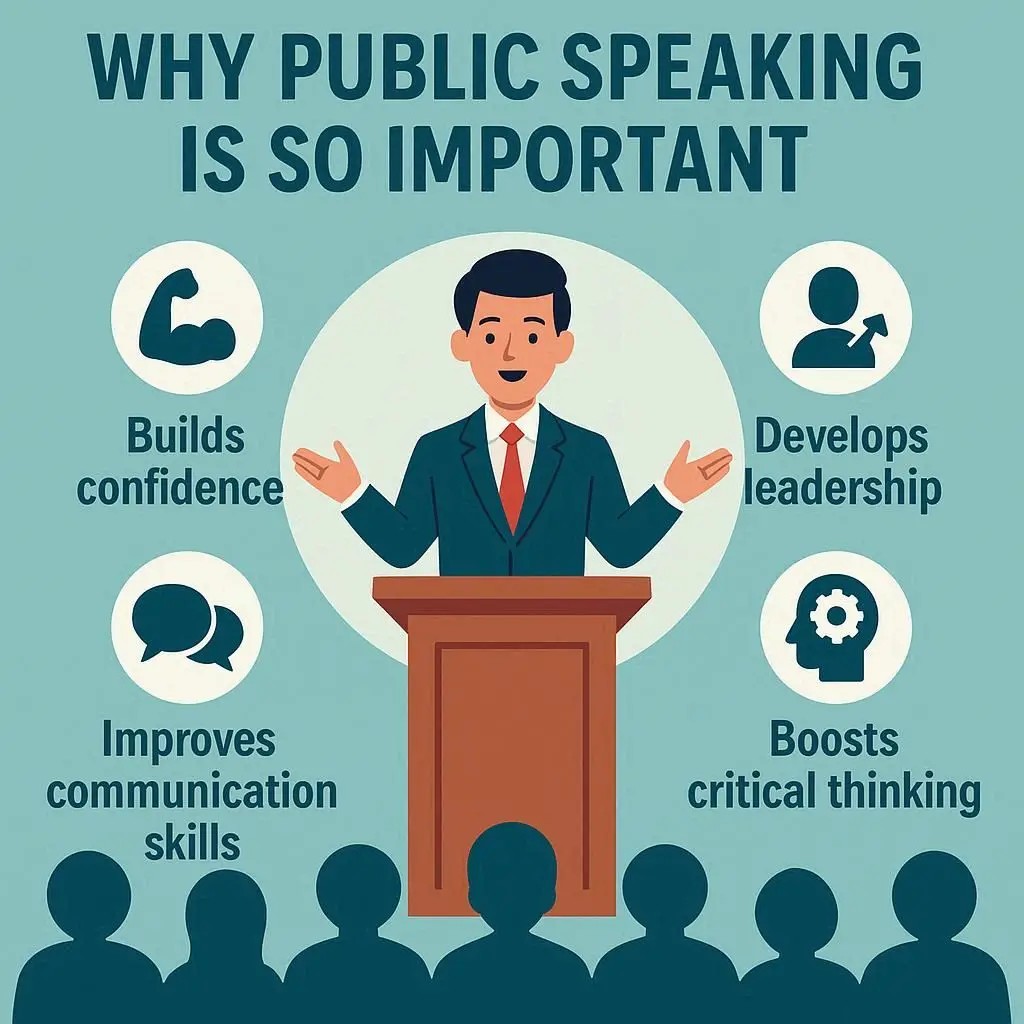Why is public speaking so important?
Why Public Speaking Is So Important: Skills and Benefits
Public speaking is a critical skill that can significantly impact both personal and professional success. It goes beyond speaking in front of an audience—it’s about communication, leadership, and influence.
1. Enhances Communication Skills
Clarity and articulation: Public speaking teaches you to convey ideas clearly and confidently.
Active listening: Engaging with audiences improves your ability to understand and respond to others.
Persuasive skills: Helps you present arguments convincingly and influence opinions.
2. Builds Confidence
Speaking in front of groups reduces fear and anxiety over time.
Boosts self-esteem, enabling you to participate in meetings, interviews, and presentations.
Encourages taking initiative and leadership roles in personal and professional settings.
3. Improves Leadership and Career Opportunities
Leaders need to motivate, inspire, and guide teams, all of which require strong public speaking skills.
Professionals with excellent communication are often considered for promotions and key responsibilities.
Public speaking experience enhances your ability to network and build influence.
4. Strengthens Critical Thinking
Preparing speeches or presentations requires researching, organizing, and structuring ideas logically.
Encourages problem-solving and adaptability when addressing questions or unexpected situations.
5. Enhances Personal Growth
Helps you develop emotional intelligence by understanding audience reactions and responding appropriately.
Encourages self-reflection, as you learn to evaluate and improve your delivery.
Builds resilience by learning to handle feedback and constructive criticism.
6. Expands Your Influence and Impact
Public speaking allows you to share knowledge, advocate for causes, or inspire change.
Effective speakers can mobilize groups, educate communities, and lead initiatives.
Key Takeaways
Public speaking is essential because it:
Improves communication and persuasion skills.
Builds confidence and leadership abilities.
Strengthens critical thinking and personal growth.
Expands your influence and professional opportunities.
Public speaking is a skill that transcends mere presentations; it's a vital tool for personal growth and professional success.
Importance of Public Speaking in Professional Life
In the professional world, public speaking is far more than just giving a formal speech; it encompasses everyday interactions that profoundly impact one's career trajectory.
Persuade and Influence: Whether pitching an idea to a client, advocating for a project to stakeholders, or negotiating within a team, the ability to articulate your thoughts persuasively can sway decisions and build consensus.
Inform and Educate: From presenting research findings to training colleagues on new software, clear and concise informative speaking is essential for knowledge transfer and operational efficiency.
Motivate and Inspire: Leaders use public speaking to rally teams, inspire action, and foster a shared vision.
The ability to convey passion and enthusiasm can significantly boost morale and productivity. Build a Personal Brand and Network: Speaking at industry conferences or internal meetings increases your visibility and establishes you as an authoritative figure and thought leader.
This, in turn, can open doors to new collaborations and career opportunities. Enhance Communication Skills: The process of preparing and delivering a speech sharpens both verbal and non-verbal communication, making you a more effective communicator in all aspects of your professional life.
How Public Speaking Builds Confidence
The act of public speaking, while often daunting, is a powerful catalyst for building self-confidence.
Mastering a New Skill: Learning any new skill boosts confidence, and public speaking is no exception.
Successfully delivering a talk, even a short one, provides a sense of accomplishment. Experience Breeds Confidence: Regular practice and exposure to public speaking situations gradually diminish nervousness.
The more you speak, the more comfortable you become, transforming initial fear into a sense of control and self-assurance. Interacting with Authority Figures: Public speaking often involves addressing senior colleagues or leaders. Repeatedly doing so helps you become more comfortable and assertive in these high-stakes interactions, transferring that confidence to other professional dialogues.
Receiving Feedback: While feedback can be daunting, constructive criticism helps you identify areas for improvement, while positive affirmations provide valuable social confirmation that your message resonated, further boosting your self-esteem.
Authenticity: Public speaking can encourage you to be your true self, as there's less room to hide behind a facade.
This authenticity can make you feel more comfortable in your own skin and more genuine in your interactions.
Techniques to Improve Speaking Skills
Improving public speaking skills is a journey that involves deliberate practice and strategic application of various techniques:
Know Your Audience and Purpose: Before crafting your message, understand who you are speaking to (their demographics, existing knowledge, and interests) and what you aim to achieve (to inform, persuade, or entertain).
Tailor your content and delivery accordingly. Structure and Outline Your Speech: Organize your thoughts logically with a clear introduction, main points, and conclusion.
Even for short talks, an outline ensures coherence and helps you stay on track. Practice Extensively: Rehearse your speech multiple times.
Practice in front of a mirror, record yourself (and listen, rather than just watch, to focus on your words), and deliver it to friends or family for feedback. This helps with pacing, clarity, and comfort. Fine-Tune Your Delivery: Pay attention to non-verbal cues. Maintain eye contact with various audience members, use natural gestures to emphasize points, and vary your tone and volume to keep listeners engaged. Avoid unnecessary fidgeting.
Keep Visual Aids Simple: If using slides, keep them clean, concise, and visually appealing.
They should support your message, not replace it or overwhelm the audience with text. Start Strong and Tell a Story: Capture your audience's attention early with a compelling opening – a surprising statistic, a relevant anecdote, or a thought-provoking question.
Weave stories into your narrative to make your message more memorable and relatable. Pace Yourself and Pause: Nervousness can lead to speaking too quickly.
Consciously slow down, take deep breaths, and incorporate strategic pauses to allow key points to sink in. Pauses can also help you gather your thoughts. Seek and Utilize Feedback: Actively ask for constructive criticism after practice sessions and presentations.
Use this feedback to identify weaknesses and refine your approach for future engagements. Be Yourself and Connect: Let your personality shine through.
Be authentic, conversational, and aim to establish a rapport with your audience.
Overcoming Anxiety and Fear of Speaking
Glossophobia, the fear of public speaking, is common, but it can be managed and significantly reduced with strategic approaches:
Thorough Preparation is Key: The more you know your topic and have practiced your delivery, the more confident and less anxious you will feel.
This reduces the fear of making mistakes. Challenge Negative Thoughts: Recognize and actively counter negative self-talk. Replace worries about judgment or failure with positive affirmations about your ability and the value of your message.
Visualize Success: Before your presentation, close your eyes and vividly imagine yourself speaking confidently, with the audience responding positively. This positive visualization can shift your mindset from fear to anticipation.
Breathing Techniques: Practice deep, slow breathing exercises to calm your nervous system.
Deep inhalations and slow exhalations can help steady your voice and reduce physical symptoms of anxiety. Start Small: If large audiences are intimidating, begin by speaking to smaller, more informal groups (friends, colleagues) and gradually work your way up.
This "graded exposure" helps build confidence incrementally. Focus on the Message, Not Yourself: Shift your attention from your internal nervousness to the value you are providing to your audience.
When you focus on helping them learn or understand, your anxiety often recedes. Embrace Nervous Energy: Reframe nervousness as excitement or adrenaline that can fuel your passion and energy during your speech.
Don't Fear Silence: If your mind goes blank, a brief pause is usually not as long as it feels.
Take a deep breath and regain your composure; the audience will likely be understanding. Seek Support: Consider joining organizations like Toastmasters International, which provide a supportive environment for practicing public speaking and receiving constructive feedback.
Professional help, such as cognitive behavioral therapy, can also be beneficial for severe anxiety.
Applying Public Speaking Skills in Various Settings
Public speaking skills are highly transferable and valuable across a multitude of professional and personal settings:
Work Meetings and Presentations: From presenting quarterly reports to leading team discussions, clear communication and confident delivery are crucial.
Networking Events: Engaging in conversations, introducing yourself, and briefly explaining your work requires concise and compelling verbal communication.
Job Interviews: Articulating your experience, skills, and aspirations effectively is essentially a form of persuasive public speaking.
Teaching and Training: Educators, trainers, and mentors rely on strong public speaking skills to convey information clearly and engage their audience.
Sales and Marketing: Pitching products or services, giving demonstrations, and building rapport with potential clients all leverage public speaking abilities.
Community and Civic Engagement: Advocating for causes, leading community meetings, or giving toasts at events all benefit from confident and articulate speaking.
Virtual Presentations and Webinars: With the rise of digital platforms, public speaking now extends to online environments, requiring adaptation of techniques for virtual engagement.
By continuously developing and applying these skills, individuals can unlock new opportunities, enhance their leadership capabilities, and make a greater impact in all aspects of their lives.












